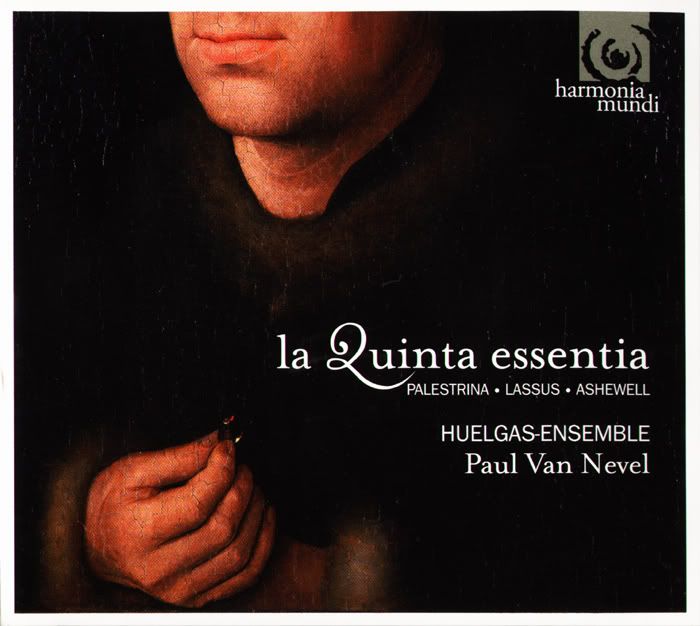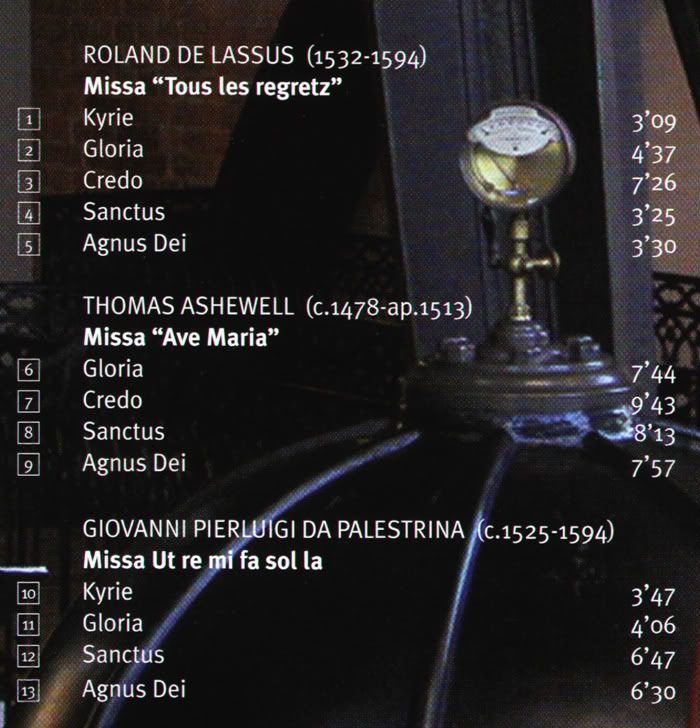 |
| NetLab · Rules · Torrent Tracker · Have a problem? · Eng/Rus |
 Help Help
 Search Search
 Members Members
 Gallery Gallery
 Calendar Calendar
|
| Welcome Guest ( Log In | Register | Validation ) | Resend Validation Email |
|
Posted: 27-10-2008, 23:04
(post 1, #863251)
|
||||||||||||||||||
|
Pro Member Group: Members Posts: 695 Warn:0% |
Huelgas Ensemble La Quinta essentia Label: Harmonia Mundi, HMC 901922 Year: 2007 Performers: Huelgas Ensemble Paul Van Nevel and the Huelgas-Ensemble have collected the quintessence of a musical art. Their recording illustrates the three dominant styles of the Renaissance: the Roman school, Franco-Flemish polyphony, and English late Gothic. The chosen formal framework is the mass, and three of its greatest masters contribute to the programme: Lassus, ‘counterpoint on a human scale’, Palestrina, ‘the path of transcendence’, and Ashewell, ‘the irresistible appeal of virtuoso ornamentation’. A whole world recreated in sound! The Huelgas-Ensemble presents another superbly sung, thoughtfully programmed recording that offers for our consideration what conductor Paul Van Nevel describes as "the three major styles of the Renaissance", represented by Roman, Franco-Flemish, and English Late Gothic masses. It's easy to understand the choice of Palestrina (Roman) and Lassus (Franco-Flemish)--but with Thomas Ashewell we truly have a horse of a different color, stylistically for sure, but also one with the most meager catalog (only two extant complete works, according to Van Nevel). The term "late Gothic" as applied to musical style also is not a common one, but Van Nevel obviously has carefully--and probably cleverly--chosen to demonstrate its aspects with Ashewell rather than with a more familiar yet more commonly heard contemporary composer such as Cornysh, Fayrfax, or Carver. All of this aside, what we have here is a very engrossing concert during which you really can hear the distinct differences Van Nevel talks about in his informative notes, and where you can thoroughly revel in sonorities (especially in the Lassus) that resonate so fully and deeply that you suspect some electronic trickery must be involved. But no, we learn that the "trick" is in having found an ideal performing space--the Museum of Water in the Convento dos Barbadinhos in Lisbon (there are several color pictures of this), a high-ceilinged, open-storied architectural marvel whose primary materials seem to be wood and glass and stone. Combine this setting with Huelgas-Ensemble's absolutely dead-on intonation and focused, dynamic collective sound (not to mention some fine musical material) and you have one incredible vocal-performance event. You know you're in for something special right from that first soul-satisfying cadence in the Lassus Kyrie. I was further intrigued at how Lassus preserved elements of his original model (Gombert's "Tous les regretz" chanson)--for example, Gombert's typical close-layered imitation technique using very short melodic bits (apparent in the Sanctus)--while still reconstituting the work as his own, and as a functional, formidable, affecting liturgical entity. Although Palestrina's "Ut re mi fa sol la" Mass is not among his most illustrious in the genre, listeners can easily appreciate its distinctive cantus firmus and the composer's facility and varied treatment of it throughout. Again, Van Nevel has chosen a worthy yet rarely recorded work--another of this program's benefits. As mentioned, Ashewell's Ave Maria Mass is an adventure unto itself, characterized by long melismas, high treble parts, liberal use of cross relations, and above all, very complex rhythms within and between parts, reminiscent of 15th-century Northern European music from an era even before Ashewell (who was born around 1480, a generation before Lassus and Palestrina). There's nothing left to say, except if you're a fan of Renaissance choral music, don't hesitate. Paul van Nevel is unquestionably one of the mainstays among artists who specialize in gothic and Renaissance choral music. Having founded the Huelgas Ensemble in 1971, his catalog of recordings begins in the late '70s when his group was recording for the Belgian labels; one of the few early music specialists from his time still active, van Nevel just gets better and better. After a long association with Sony Classics, van Nevel landed with Harmonia Mundi and has been recording for the label since 2002; while the quality of his output remained high, it seemed to fall a bit short of the standard of his last Sony efforts, for example Mattheus Pipelare: Missa L'homme Arme or Alexander Agricola: A Secret Labyrinth. Although his and Huelgas' 2004 disc of Alfonso Ferrabosco comes close, nothing van Nevel has done for Harmonia Mundi thus far approaches the exalted level of La Quinta essential, in which van Nevel has clearly regained his stride; it is a milestone in his career and that of Ensemble Las Huelgas. The premise of La Quinta essential is relatively simple: illustrate the different angles of the sixteenth century by drawing together three mass settings from composers with different points of view, in this case Lassus, Palestrina, and mega-obscure Englishman Thomas Ashewell, whose extant catalog of works runs to two items. None of these works can be termed being particularly well known; Palestrina's Missa Ut re mi fa sol la has been recorded two or three times, Lassus' Missa "Tous les regretz" one other time, and Ashewell, never. The performances by Huelgas are seamless and seemingly definitive; however, the most striking thing is how successfully van Nevel is able to parse out what makes these three works so different. Palestrina achieves a crystal-clear transparency under his direction, and as you listen to the conclusion of the Agnus Dei you might not be blamed for thinking you are in the presence of God; its transcendent beauty takes the listener apart piece by piece. It is not unlike the scene in The Little Flowers of St. Francis where the saint converses with the heavens as a jealous monk looks on. However, not all of us like to be in the glare of God's presence all the time, and that's where Lassus comes; his mass is worldly, studied, and evokes the chambers of the Royal courts where it was likely first heard - this is the music of kings, princes, dukes, and other noblemen. It may not have divinity, but it has power. Ashewell is earlier than the other composers by at least a half century, and his work retains a conspicuous amount of gothic practice; although he was certainly aware of Dunstaple, it doesn't seem as though Franco-Flemish practice affected him much, if at all. Ashewell was a man of the people; his Missa Agnus Dei seems rough hewn at first, owing to its highly plagal atmosphere and abundance of false relations. But along with its challenges, arcane style, and strangeness, there is a feeling of perfection at work in Ashewell's mass owing to his abundance of ideas and seamless way of knitting them together. The fabric may be coarse, but the garment is made well. There is no reason Renaissance music buffs would want to avoid this release. However, for neophytes who have no understanding whatsoever as to why anyone would want to listen to music that's so old, but at least an interest in finding out the answer, van Nevel and the Huelgas Ensemble's effort is a wonderful way in the door. Music doesn't get much better than this Tracklist: Missa "Tous les regretz" Roland de Lassus 01. Kyrie 3'09 02. Gloria 4'37 03. Credo 7'26 04. Sanctus 3'25 05. Agnus Dei 3'30 Missa "Ave Maria" Thomas Ashewell 06. Gloria 7'44 07. Credo 9'43 08. Sanctus 8'13 09. Agnus Dei 7'57 Missa ut re mi fa sol la Giovanni Pierluigi da Palestrina 10. Kyrie 3'47 11. Gloria 4'06 12. Sanctus 6'47 13. Agnus Dei 6'30   LOG
This post has been edited by kgkk on 27-10-2008, 23:08 |
||||||||||||||||||
|
|||||||||||||||||||


Powered by Invision Power Board v1.3.1 Final.

